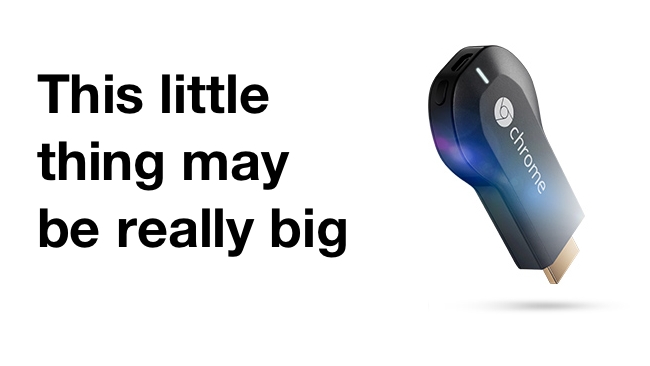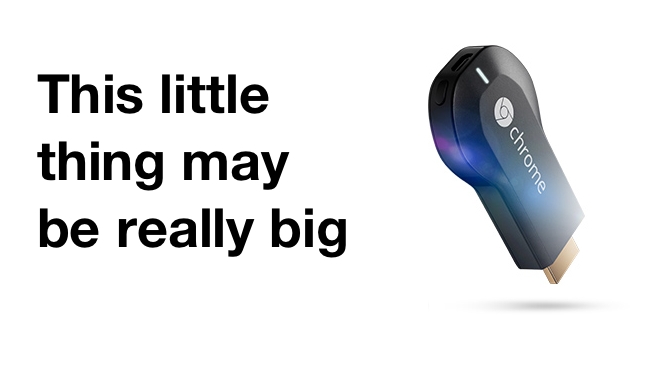
 Chromecast
Chromecast
An innocent-looking dongle is set to disrupt the TV industry
Google's produced a lot of clever stuff over the relatively few years it's been in business. A (now discontinued) policy of allowing workers to spend 20% of their working hours on "personal projects" has led to a bewildering array of Google products and services, many, if not most of which are binned quietly after being given an opportunity to live in the Google ecosystem.
There have been some spectacular failures, like the clever but also perplexing Google Wave, and the short-lived media streamer, the Nexus Q
This latter device was beautifully engineered, and its price reflected this: it can't have been cheap to produce. But it only supported what was then a limited repertoire of Google services, and in the light of its shallow capabilities and its price, which was way out of the "impulse buy" zone, it was quickly canned, never to be seen again.
Except that the idea lived on. It was just too powerful a meme to drop completely.
Control your TV
It's worth remembering that Google, just like Apple and Sony (and Samsung, and just about every CE manufacturer) wants to have control over your TV.
That's why it launched Google TV a couple of years ago. Initially it looked like this might be gaining traction, especially when Sony announced that their TVs would be supporting it. (Slightly surprising, because Sony owns so much content that you would expect them to want to control the delivery of it). It was a valiant attempt to "standardise" smart TVs on Google's platform, but the trouble is that Smart TVs just aren't that smart compared to tablets, phones and laptops.
That's bad enough, but positively the worst thing about Smart TVs is the remote controls. While we're all normalised now to snazzy animated touchscreen user interfaces, Smart TV users have to type URLs on a remote control that is better suited to ejecting DVDs from their trays.
Actually, not even that is the worst thing about Smart TVs. That honour is reserved for the fact that - even though it's hard to buy an upmarket TV that isn't "Smart" - nobody uses them. Only a fraction of Smart TV owners actually connect them to the internet.
And yet, more people than ever are using YouTube and services like NetFlix.
Large numbers
Meanwhile, Apple TV is quietly selling in surprising large numbers, and is by far the most popular streaming device that's sold today. But it only works with Apple devices.
Google is at its cleverest when it tries to virtualise things. Google's Chrome OS is a computer in a browser, as well as a browser in a computer. Buy a Chromebook, and you'll never have to "install" any software. If your Chromebook needs replacing, just sign in on the new one and all your stuff will be there - because it never was there: it was in Google's Cloud.
Google has now applied this logic to the Chromecast: a $35 computer and WiFi transceiver that is the size of a key fob. This thing is possibly the most deceptive-looking device that's ever been produced, and we mean that in a good way. Without any fuss, and without any hint of the complexity of what's inside, this unprepossessing object is able to connect to external URLs, recieve video and audio streams, and decode (decompress) them to an uncompressed HDMI feed for any device with an HDMI input. That means just about every HD television on the planet.
Smarter than ever
As far as the TV is concerned, it's just another HDMI source. You select it with your TV's remote control, and sit back while your TV becomes smarter than it's ever been. And then - your touchscreen devices (any and all of them) become the best TV remote control you've ever had.
The absolute beauty of this approach is that it is so abstracted from any and all hardware that it will work in virtually any situation. Any device that can run Chrome (and that's almost literally any device) can work with the Chromecast. Google doesn't need to ask anyone's permission for this. And because Chromecast works with anything with an HDMI socket, it's almost absurdly flexible.
Google's final act of genius is the price. It's $35 dollars. That's less than the cost of the average Thunderbolt cable and less than some HDMI cables as well. Suffice to say that cost isn't going to be a deterrent with this.
There are no certainties in this business, but if Chromecast isn't a massive (and disruptive) hit, we'll be very surprised.
Tags: Business


Comments